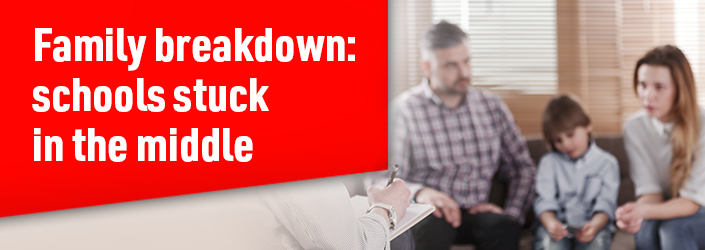Family breakdown – schools stuck in the middle

Teachers are well aware that teaching is only one part of their daily job.
The care of their students goes hand-in-hand with delivering education and learning. Teachers deal directly with the emotional and social well-being of their students, particularly when a student’s parents separate.
With almost one in two marriages ending in divorce in Australia and one in five children under 18, with one parent living elsewhere, the children may endure a stressful time whilst parents are dealing with their own stress. At some point, this stress may also affect teachers—and education support staff.
Teachers have daily contact with students in the school week, and through this contact, they provide security and reassurance for the students, which in turn gives the student a ‘secure’ environment whilst continuing their studies.
Offering a nurturing but professional support structure requires the teacher and school, and hopefully the parents, to work together. Some separations may be amicable, others may be bitter, legal wars, so finding a workable, stable relationship between the parent/s and school may be a challenge in itself. Inevitably, the child will get caught up in this, with potential to suffer adverse effects.
For teachers this adds potential burden of responsibility in assisting a student through their parent’s separation and the time taken to assist one child will inevitably impact the teacher’s time for other students.
Teachers will need to maintain professional distance and avoid emotional attachments to the student, as this may lead to over involvement and a loss of objectivity for both themselves and the student. Support and maintenance of schedules and a consistent school routine will offer the student the stable, reliable and caring platform they need.
Often, counselling and therapy dogs at schools are offered to assist students through a variety of difficulties, however, teachers, and education support staff, may also need assistance if they encounter difficult and traumatic situations that require unpacking and debriefing.
Good schools will recognise the importance of caring for all staff and students in order to create an openness to and respect for non-traditional families and to develop positive connections with parents. Stable and positive connections will assist students to adapt and feel reassured.
One of the biggest challenges for teachers is dealing with a bitter or disagreeing parenting situation, whereby agreement on pathways and workload for the student are disrupted by arguments, difference of opinion on outcomes—driven potentially by negativity towards the other parent— adding further workload and stress for the teacher (and student).
On top of this, teachers and schools may need to duplicate their information to the separated parents resulting in higher workload, particularly where separate questions and feedback may be required.
Schools normally have procedures and policies in place for dealing with family issues. Teachers should follow these closely and work with the school management openly to ensure they are supported appropriately.
IEU members can also consult their school Organiser for any questions relating to school support – 8410 0122
Sources:
How teachers can help support children during their parents’ divorce.
Linda Mahony, Senior Lecturer in Education, Charles Sturt University.
The Conversation – September 28, 2018
https://theconversation.com/how-teachers-can-help-support-children-during-their-parents-divorce-102900
DIVORCE: RECOMMENDATIONS FOR TEACHERS AND PARENTS
Katharine Green, Melody McAllister, Shannon Metcalf.
https://www.education.udel.edu/wp-content/uploads/2013/01/Divorce.pdf
Stuck in the Middle. Emily Campbell, IEU.
https://publications.ieu.asn.au/2020-september-bedrock/articles-1/stuck-middle/

